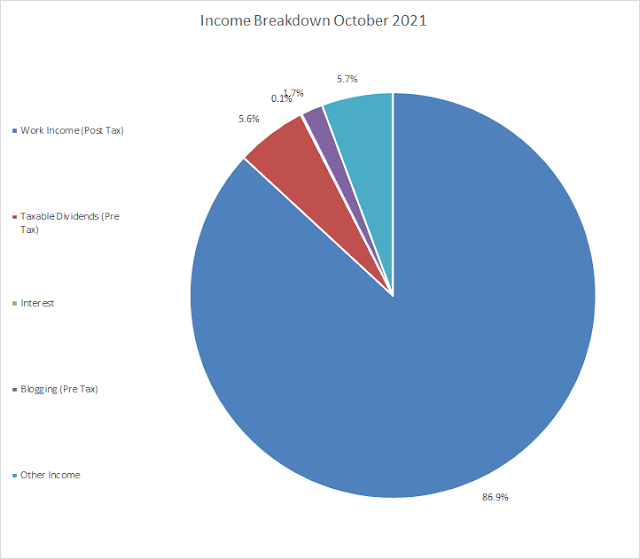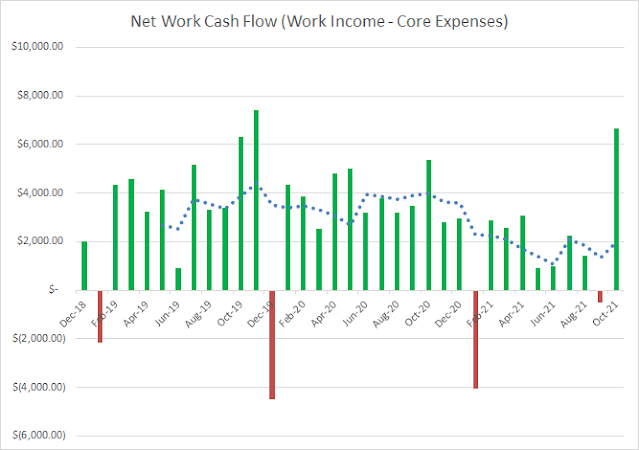Budget Check & Cash Flow Update - October 2021
 |
| Budget Check & Cash Flow Update - October 2021 |
The saying goes that cash is king. While that's true, a more accurate saying when it comes to finances is that CASH FLOW is king. Whether you're retired, still working or just starting out the only way you can improve your financial house is to have positive cash flow.
If you're in the accumulation phase then that positive cash flow allows you to save and invest to build up your future cash flow. If you're already retired, or FIREd, then congratulations because I'm sure your cash flow is well above what you need.
When it comes to personal finance it's rather simple: income - expenses = savings and savings x investing x time = financial independence. There's obviously two main levers there and while we'd all like to increase our income, many times reducing expenses is some of the low hanging fruit that you can go after to increase your savings.
Budget Check
Total income for October was excellent and came in at just shy of $10,000 at $9,991.82. That's well above the TTM average of $Even better is that's above the TTM average of $6,961 which includes the various COVID stimulus payments. Of course it certainly helps that October was a 3 paycheck month since I'm paid on a bi-weekly schedule. The bulk of my income, ~87%, came from my day job, le sigh; although that should come as no surprise since we're still in the accumulation phase. Dividends provided over $560 for the month.
Total expenses for October were a bit higher than I'd like, but not completely out of the ordinary. During October total expenses came to $2,611.39. The TTM average total expenses decreased slightly to $4,499.87. Still much higher than I'd like, but generally moving in the right direction.
Core expenses were about in line with what I would expect given that we didn't have the homeowners or car insurance to pay for during the month after paying the full premium during September. October's core expenses were just $2,013.30 and the TTM average is now $3,281.04.
For the month we ended up with a net positive cash flow of $7,380.43 when looking at all income sources. Based on just work income, but including all expenses, the net cash flow came to $6,069.34.
Our savings rate from all income sources came to 74% while our savings rate from work income alone was 70%. The savings rates are all based off of net take home pay and don't include the pre-tax savings towards my 401k or HSA or the post-tax ESPP withholding.
*A few notes about the cash flow check in. All income is only income that I receive and does not include my wife's income likewise for the expenses. We've found it's easiest for us to just keep separate accounts since I'm gone most of the time for work. Also, pre-tax withholding for the 401k (I currently withhold 8% in order to get the full 5% employer match) and the ESPP through my employer (4% post tax withholding) are not included in the above savings amount.
Net Work Cash Flow
While my net cash flow above includes all income and all expenses, I wanted to get a more granular look at the cash flow that is available each month. So I started calculating my Net Work Cash Flow which is calculated as post-tax income only from my work and core expenses. Think of it more like a free cash flow for a business.
The above might be the true cash flow each month; however, it's not really representative of our "free cash flow" each month. The idea is that all other income sources outside of work income are already going directly into savings or investing or in the case of dividends remaining in the brokerage account. On the expense side the majority of our expenses fall into the core side and most of the other expenses are completely discretionary spending.
I believe this gives a better idea of our "free" cash flow from "normal operations" each month that can/will be used for debt reduction, saving and investing.
My net work cash flow showed a huge bounce back after September's negative print. Of course September's expenses were higher than normal thanks to paying 12 months of homeowners insurance and 6 months of car insurance premium all at once. Net work cash flow for October came to $6,069.34 although the TTM average is $1,828.91.
Non-Work Cash Flow
Passive income for October totaled $572.30 and covered 28.4% of core expenses. Meanwhile, non-work income totaled $1,311.09 and covered 65.1% of core expenses for October.
Conclusion
October was a great month for our cash flow, of course having that third paycheck really helps. Overall I'm happy with how things turned out from an income and expense perspective although I always wish the income was higher and the expenses lower.
As far as low hanging fruit to reduce expenses refinancing our mortgage is probably the easiest thing to do. We can likely lower our monthly payments anywhere between $100 and $300 depending on what interest rate and whether we extend the mortgage back out to 30 years or not. Since this isn't likely to be our forever home I think it would make sense to refi into a new 30 year to lower our monthly payment as much as possible.
Make sure you sign up to receive new posts to your email so you don't miss anything. And be sure to follow me on Twitter @JC_PIP to get up to the minute news of purchases for my portfolio or if you prefer Pinterest or Facebook I'm on there too.
How was your cash flow for the month? Do you have anything on tap that can increase your income or reduce your expenses?



Comments
Post a Comment